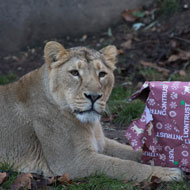
Zoo animals are getting into the Christmas spirit, tucking into festive treats and even enjoying a thick blanket of snow in Scotland.
Keepers at ZSL London Zoo provided a range of seasonal surprises for their residents, including presents for the Asiatic lions to rip open, sacks full of carrots for the donkeys and mini Santa stockings for the squirrel monkeys. The zoo’s Humboldt penguin colony even had their very own Christmas tree, complete with presents.
ZSL’s zoological manager Mark Habben said: “We love a bit of Christmas cheer at ZSL London Zoo, and like to find fun ways for the animals to join in the celebrations.
“We’ve come up with a variety of activities to encourage them to use their natural skills, like foraging or sniffing out their next meal: our lionesses will love using their hunting prowess to rip open their presents, while our penguins will be searching for treats under the tree - just like kids all over the country on Christmas day.”
Meanwhile, a thick blanket of snow has fallen at RZSS Highland Wildlife Park, where many of the animals that are adapted to cold weather are relishing the change to their environment.
The muskox and Amur tigers particularly enjoyed exploring and ripping into wrapped presents, giant snowballs and Christmas trees to get at their favourite treats, keepers said.
“The tigers definitely give the impression of being just large domestic cats in how they interact with the keeper-provided distractions,” said Douglas Richardson, head of living collections. “Whereas the muskox are as interested in their ‘toys’ but they are definitely trying to pummel their presents into the ground.”
Image © ZSL



 The Veterinary Medicines Directorate (VMD) is inviting applications from veterinary students to attend a one-week extramural studies (EMS) placement in July 2026.
The Veterinary Medicines Directorate (VMD) is inviting applications from veterinary students to attend a one-week extramural studies (EMS) placement in July 2026.